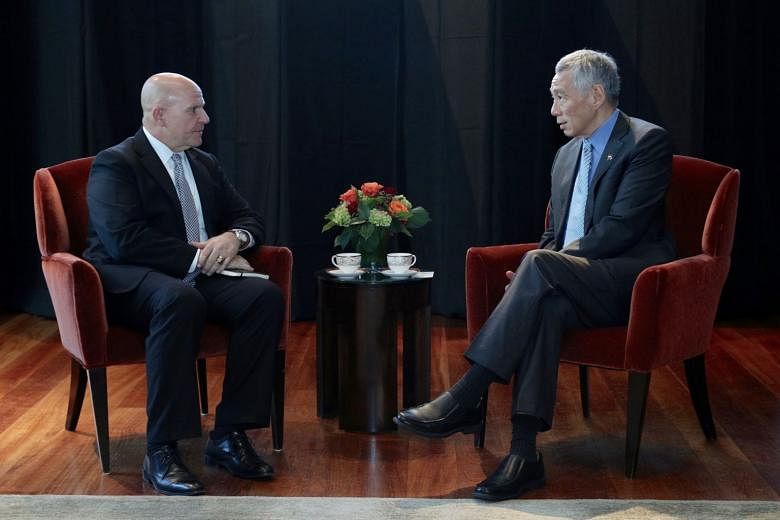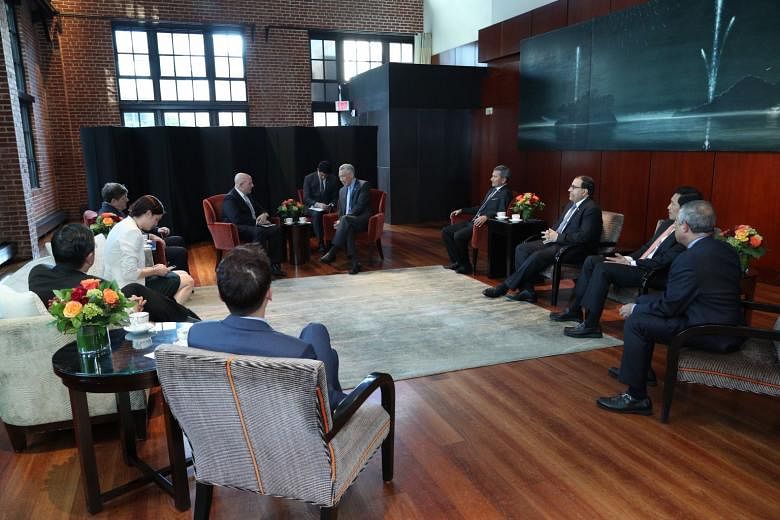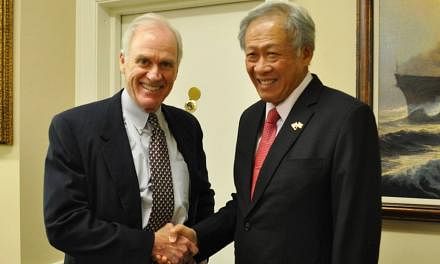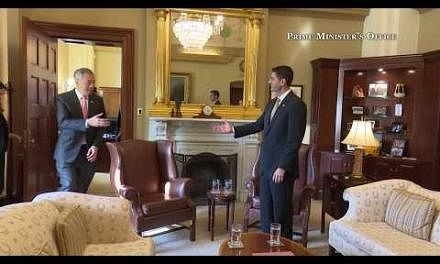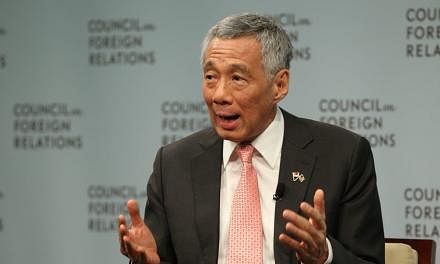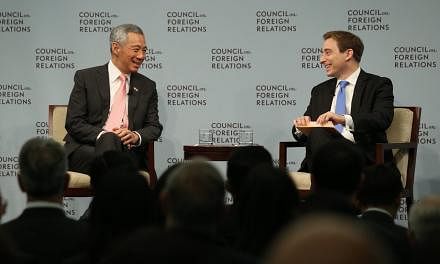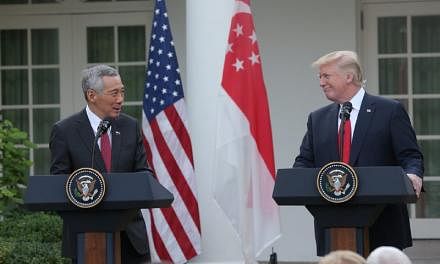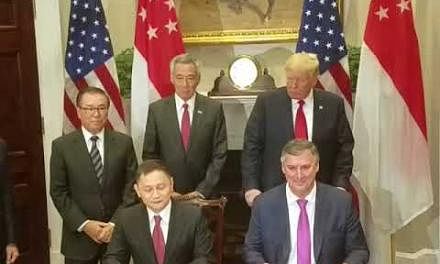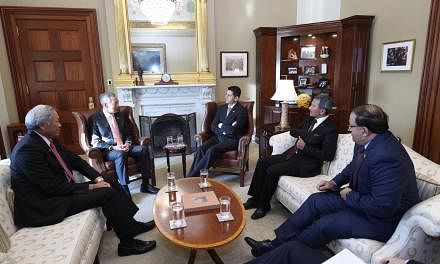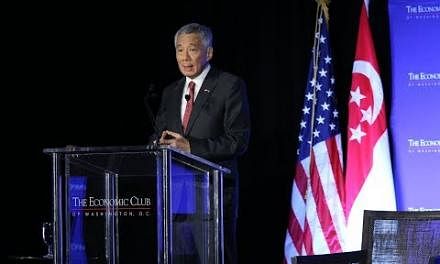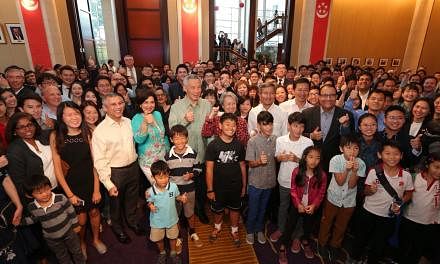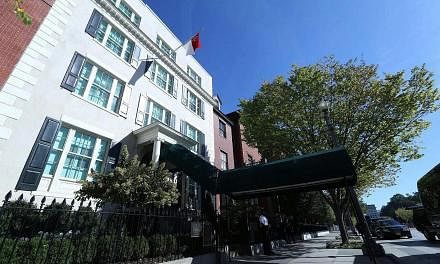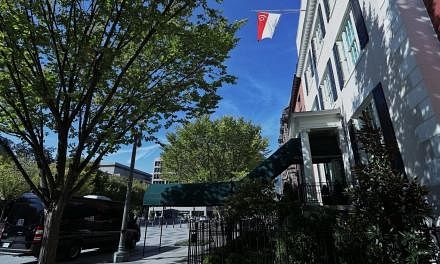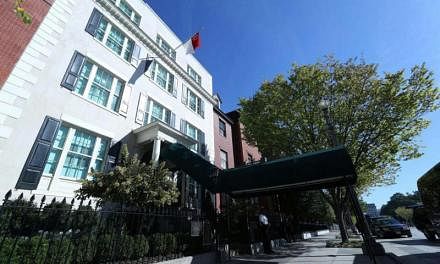WASHINGTON - The threats of terrorism and North Korea's nuclear programme were on the agenda when United States National Security Adviser H.R. McMaster called on Prime Minister Lee Hsien Loong on Tuesday (Oct 24).
"Both sides exchanged views on the threat of terrorism in the region and expressed concern about the Democratic People's Republic of Korea's continued development of its illegal nuclear and ballistic missile programmes," the Prime Minister's Office (PMO) said, referring to North Korea by its official name.
"They also agreed on the importance of the US' continued commitment towards deepening its engagement of the Asia-Pacific," it added.
Also at the meeting were Minister for Foreign Affairs Vivian Balakrishnan, Minister for Trade and Industry (Industry) S. Iswaran and Second Minister for Defence and Minister for Education (Higher Education and Skills) Ong Ye Kung.
Both security issues had featured prominently when PM Lee and President Donald Trump met at the White House a day earlier.
Highlights of Monday's meeting, which Cabinet members from both countries attended, were released by the White House and the PMO in a joint statement on Tuesday.
The leaders affirmed the strong and enduring bilateral partnership based on mutually beneficial cooperation in economic, defence, security and people-to-people spheres.
"They both recognised Singapore's steadfast partnership on issues of mutual interest and shared principles," the statement added. "Singapore has been an anchor for the presence of the United States in the Indo-Pacific, underpinning regional peace and prosperity for the common benefit of the region and the United States."
The leaders pledged to strengthen cooperation to counter the threat of ISIS, and Mr Trump welcomed Singapore's commitment to extend its existing contributions to the global coalition to defeat it - a medical team, a KC-135R tanker, and an Imagery Analysis Team.
PM Lee had on Monday said Singapore would extend its deployment of assets and personnel into 2018.
On North Korea, both leaders condemned its "unlawful" missile launches and nuclear tests, that are in clear violation of United Nations Security Council Resolutions.
They also reaffirmed their commitment to fully implement the resolutions and to "consider additional measures to compel the regime to engage in meaningful dialogue about a different future".
Pyongyang's provocations have drawn a strong response from Mr Trump, and will be a key theme of his visit to Asia next month.
The statement also covered economic, defence and global issues.
On economic ties, both leaders said the US-Singapore Free Trade Agreement had successfully expanded trade, enhanced prosperity, and promoted broader relations for the benefit of both. Beyond close defence ties including rotational deployments and training, Singapore has also signed over $5.8-billion worth of defence contracts with US companies in the past three years.
Both countries also aim to sign tax agreements on information exchange and compliance this year.
The statement also touched on developments in the South China Sea. Both sides reaffirmed the importance of safeguarding peace and stability, freedom of navigation and overflight, and the peaceful resolution of disputes, including full respect for legal and diplomatic processes under international law. And they reiterated their support for the expeditious conclusion of an effective and binding Code of Conduct.
Turning to the humanitarian crisis in Rakhine State and the Myanmar-Bangladesh border, both leaders "urged the government of Myanmar to end the violence, ensure the safe, voluntary and dignified repatriation, resettlement, and rehabilitation of displaced persons, and implement in the shortest time possible the recommendations of the Advisory Commission on Rakhine State".
They also expressed their support for Asean's role in working with the Myanmar government to provide humanitarian assistance to all affected communities.
